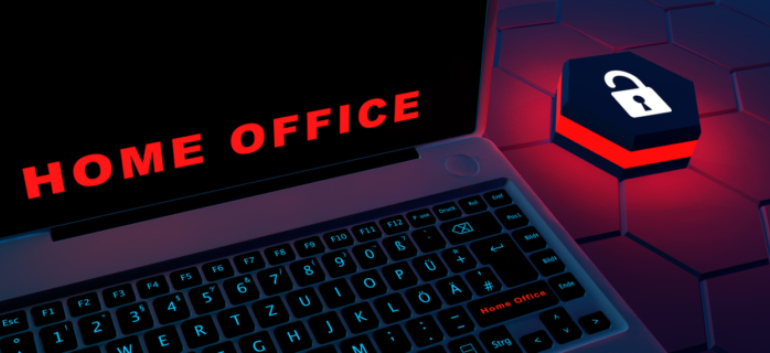Working from home comes with its own set of challenges, but with the proper security measures in mind, you can better ensure a secure home workspace.
Let’s shift our focus from coronavirus for a moment. Even without a global pandemic and a stay-home initiative, remote work has been on the incline for the past decade. In fact, a recent study by CNBC found more than 70 percent of global employees work remotely at least once per week. Bringing the current state of affairs back into the picture, the COVID-19 pandemic and resulting lockdowns in many parts of the world have forced a majority of employees into full-time working from home for the time being.
Below are tips for protecting your home-based internet access with some important security software. Be sure you are equipped with the following.
Start with Cybersecurity Fundamentals
The main theme that we want to emulate is to keep your personal/work computer’s security software up to date. Be sure to use passwords on all your devices and apps. Make sure the passwords are long, strong, and unique: at least 12 characters that are a mix of numbers, symbols and capital and lowercase letters. Do not document the passwords on the computer itself, but on a notepad or somewhere around the home where you have access to them if you happen to forget.
Secure Your Work-From-Home Network
Do so by beginning with your router. Be sure to enable encryption (WPA2 or WPA3) — this mechanism scrambles the information that is sent over your network so that potential hackers are unable to read it.
WPA2 and WPA3 are the most up-to-date encryption standards to protect information sent over wireless networks. If you don’t happen to have any WPA3 or WPA2 options on your router, try updating your router software, or reaching out to a trusted IT partner like the team at Uniti Fiber to help you do so. You’ll definitely want to ensure that your home network is safe and secure against hackers, especially during this time when cybercriminals are focusing their efforts on targeting the work-from-home forces.
Monitor Your Devices
If you’re using a laptop or other wireless tablet, make sure it is password-protected, locked, and secure. Never leave it unattended – like in a vehicle or at a public charging station (if you happen to find any availability to one during this time).
This is very important. Access both your home’s personal Wi-Fi account and/or your company’s VPN (virtual protected network) access whenever possible to ensure further protection against any form of possible corruption. Refrain from public network usage; especially the sharing of sensitive information when connected to such a network.
Store Sensitive Files Appropriately
When there’s a legitimate business need to transfer confidential information from office to home, keep it out of sight and under lock and key.
For example, Uniti Fiber’s managed storage solutions include Cloud hosting and private solutions. Our flexible yet reliable digital storage options allow you to build an efficient infrastructure, letting you store, protect, optimize and leverage your information, with options to dispose of such information in a secure and confidential way.
Manage more data, more efficiently – you’ll keep your information available or unavailable and secure, and ready for growth.
Dispose of Sensitive Data Securely
Don’t make the mistake of just throwing sensitive data in your computer’s trash or recycling bin. Paperwork you no longer need can be a treasure to identity thieves if it includes personal information about customers or employees.
At Uniti Fiber, for example, our disaster recovery solutions are designed to work with your business continuity plan and protect your applications and data against downtime. Uniti Fiber offers proactive solutions to help identify front-end vulnerabilities and help keep your organization progressing with confidence.
Follow Your Employer’s Security Practices
Your home is now an extension of your office. So, never take for granted the messages and suggestions that your employer or your employer’s IT partner has implemented. Following, we’ve included more about what you might need to know.
Security Measures to Take While Working from Home
SHUT DOWN INACTIVE DEVICES
When you are not using your work from home tech devices, be sure to either shut them down completely or password-protect lock them, including any cell phones you might use to check work email or other sensitive documents.
If you can’t carve out a separate workspace in your home, be sure to collect your devices at the end of your workday and store them in a secure space. This will not only keep them from being accidentally opened or stolen but will also help further separate your work life from your home life.
ENSURING SECURE SYSTEM ACCESS
It’s time to start thinking about the ways to guard your devices — especially if you are finding yourself conducting work-related activities on personal devices — against unauthorized access. If you think cybercriminals will be sensitive to global events and refrain from attacking remote workers, you’d be sorely mistaken.
Access to your computer’s desktop should be password-protected, and the password should be a strong one. If you’re connecting your work computer to your home network, hide the device from other computers in the network.
CYBERSECURITY BEST PRACTICES
Other security precautions are not all that different from those you should be practicing in the office but still must remain top of mind.
Be cautious of phishing emails. There will be many legitimate-looking but not-legitimate-at-all emails circulating during this time that try to capitalize on fear related to things such as the pandemic, credit, or even health and personal information. Scan all emails with a sharp eye and do not open attachments or links unless they’re from a known, trusted source.
Also, be wary of social media. Once again, watch out for scams and misinformation, as criminals love using this medium to ensnare victims.
With the proper awareness and support, you can ensure a safe and secure home working environment. For more tips, tricks, and security information, reach out to Uniti Fiber. We are always here and ready to help.




